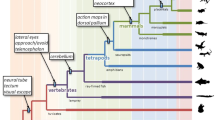Abstract
What is the distribution of cognitive ability within the animal kingdom? It would be egalitarian to assume that variation in intelligence is everywhere clinal, but examining trends among major phylogenetic groups, it becomes easy to distinguish high-performing ‘generalists’ – whose behavior exhibits domain-flexibility – from ‘specialists’ whose range of behavior is limited and ecologically specific. These generalists include mammals, birds, and, intriguingly, cephalopods. The apparent intelligence of coleoid cephalopods (squids, octopuses, and cuttlefish) is surprising – and philosophically relevant – because of our independent evolutionary lineages: the most recent common ancestor between vertebrates and cephalopods would have been a small wormlike organism, without any major organizational structure to its nervous system. By identifying the cognitive similarities between these organisms and vertebrates, we can begin to derive some general principles of intelligence as a biological phenomenon. Here, I discuss trends in cephalopod behavior and surrounding theory, and suggest their significance for our understanding of domain-general cognition and its evolution.


Similar content being viewed by others
References
Aronson, R. B. (1991). Ecology, paleobiology, and evolutionary constraint in the octopus. Bulletin of Marine Science, 49, 245–255.
Ayala, F. J. (1988). Can ‘progress’ be defined as a biological concept? In M. Nitecki (Ed.), Evolutionary progress (pp. 75–96). Chicago: University of Chicago Press.
Barrett, H. C., & Kurzban, R. (2006). Modularity in cognition: framing the debate. Psychological Review, 113, 628–647.
Boal, J. G. (2006). Social recognition: a top down view of cephalopod behavior. Life & Environment, 56(2), 69–79.
Budelmann, B. U. (1995). The cephalopod nervous system: What evolution has made of the molluscan design. In O. Breidbach & W. Kutsch (Eds.), The nervous system of invertebrates: An evolutionary and comparative approach. Berlin: Birkhauser Verlag.
Burghardt, G. M. (1977). Learning processes in reptiles. In C. Gans & D. Tinkle (Eds.), Biology of the Reptilia: Ecology and behavior. New York: Academic.
Byrne, R. (1995). The thinking ape: Evolutionary origins of intelligence. Oxford: Oxford University Press.
Campbell, C. B., & Hodos, W. (1991). The scala naturae revisited: evolutionary scales and anagenesis in comparative psychology. Journal of Comparative Psychology, 105(3), 211–221.
Emery, N. J. (2006). Cognitive ornithology: the evolution of avian intelligence. Philosophical Transactions of the Royal Society B, 361, 23–43.
Emery, N. J., & Clayton, N. S. (2004). The mentality of crows: convergent evolution of intelligence in corvids and apes. Science, 306(5703), 1903–1907.
Fiorito, G., & Scotto, P. (2005). Observational learning in Octopus vulgaris. Science, 256(5056), 545–547.
Finn, J. K., Tregenza, T., & Norman, M. D. (2009). Defensive tool use in a coconut-carrying octopus. Current Biology, 19(23), R1069–R1070.
Fitch, W. T., Huber, L., & Bugnyar, T. (2010). Social cognition and the evolution of language: constructive cognitive phylogenies. Neuron, 65(6), 795–814.
Galef, B. G. (1987). Comparative psychology is dead! Long live comparative psychology. Journal of Comparative Psychology, 101(3), 259–261.
Gibson, K. R. (2002). Evolution of human intelligence: the roles of brain size and mental construction. Brain, Behavior and Evolution, 59, 10–20.
Gould, S. J. (1988). Trends as changes in variance: a new slant on progress and directionality in evolution. Journal of Paleontology, 62(2), 319–329.
Gould, J. L. (2003). Animal cognition. Current Biology, 14, 372–375.
Grasso, F. W., & Basil, J. A. (2009). The evolution of flexible behavioral repertoires in cephalopod molluscs. Brain, Behavior and Evolution, 74, 231–245.
Hanlon, R. T., & Messenger, J. B. (1998). Cephalopod behavior. Cambridge: Cambridge University Press.
Hejnol, A., & Martindale, M. Q. (2008). Acoel development supports a simple planula-like urbilaterian. Philosophical Transactions of the Royal Society B, 363(1496), 1493–1501.
Helfman, G., Collette, B. B., Facey, D. H., & Bowen, B. W. (2009). The diversity of fishes: Biology evolution and ecology. New York: Wiley Blackwell.
Hodos, W., & Campbell, C. B. (1969). Scala naturae: Why there is no theory in comparative psychology. Psychological Review, 76, 337–350.
Humphrey, N. K. (1976). The social function of intellect. In P. P. G. Bateson & R. A. Hinde (Eds.), Growing points in ethology (pp. 303–317). Cambridge: Cambridge University Press.
Hvorecny, L. M., Grudowski, J. L., Blakeslee, C. J., Simmons, T. L., Roy, P. R., Brooks, J. A., et al. (2007). Octopuses (Octopus bimaculoides) and cuttlefishes (Sepia pharaonis, S. officinalis) can conditionally discriminate. Animal Cognition, 10(4), 449–459.
Jerison, H. J. (1973). Evolution of the brain and intelligence. New York: Academic.
Jerison, H. J., & Barlow, H. B. (1985). Animal intelligence as encephalization (and discussion). Philosophical Transactions of the Royal Society of London B, 308(1135), 21–35.
Knoll, A. H., & Carroll, S. B. (1999). Early animal evolution: emerging views from comparative biology and geology. Science, 284, 2129–2137.
Kuba, M., Meisel, D. V., Byrne, R. A., Griebel, U., & Mather, J. A. (2003). Looking at play in Octopus vulgaris. Berliner Paläontologische Abhandlungen, 3, 163–169.
MacLean, P. D. (1990). The triune brain in evolution: Role in paleocerebral functions. New York: Plenum Press.
Mather, J. A. (2008). To boldly go where no mollusc has gone before: personality, play, thinking and consciousness in cephalopods. American Malacological Bulletin, 24, 51–58.
Mather, J. A. (2009). Home choice and modification by juvenile Octopus vulgaris: specialized intelligence and tool use? Journal of Zoology, 233(3), 359–368.
Mather, J. A. (2011). Consciousness in cephalopods? Journal of Cosmology, 14.
Mather, J. A., & Anderson, R. C. (1999). Exploration, play, and habituation in octopuses. Journal of Comparative Psychology, 113, 333–338.
Packard, A. (1972). Cephalopods and fish: the limits of convergence. Biological Reviews, 47(2), 241–307.
Ruse, M. (1997). Monad to man: The concept of progress in evolutionary biology. Cambridge: Harvard University Press.
Shettleworth, S. J. (1998). Cognition, evolution, and behavior. New York: Oxford University Press.
Suboski, M. D. (1992). Releaser-induced recognition learning by amphibians and reptiles. Animal Learning and Behavior, 20(1), 63–82.
Vitti, J. (2010). The evolution and distribution of animal consciousness. Collections of the Harvard University Archives: Theses. Cambridge: Harvard University Press.
Author information
Authors and Affiliations
Corresponding author
Additional information
Special Issue “Origins of Mind” edited by Liz Stillwaggon Swan and Andrew M. Winters
Rights and permissions
About this article
Cite this article
Vitti, J.J. Cephalopod Cognition in an Evolutionary Context: Implications for Ethology. Biosemiotics 6, 393–401 (2013). https://doi.org/10.1007/s12304-013-9175-7
Received:
Accepted:
Published:
Issue Date:
DOI: https://doi.org/10.1007/s12304-013-9175-7




